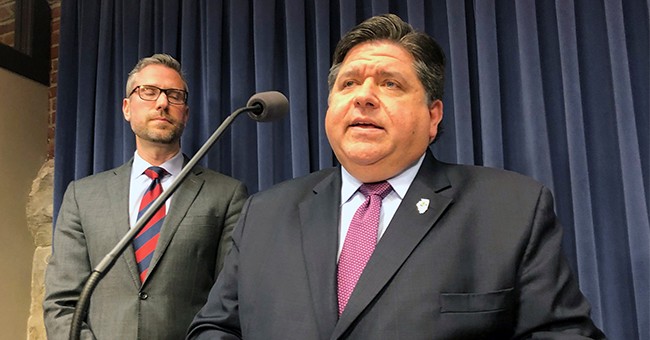
On April 2, the CARES Act cleared Congress after the government came to the conclusion that there no longer existed any constraints on federal spending. We were told we were in a crisis and that we must spend “whatever it takes” to get out of it without considering that “whatever it takes” has neither a definition nor a limit. In this atmosphere, it is only human and political nature to fly in and fraudulently get a piece of the federal pie. And this happened as lobbyists from wind power to teacher unions were there in Washington.
However, probably the biggest grifters are the states and no state is a bigger grifter than Illinois. Recently at one of Trump’s press conferences, he was asked about bailouts of states, especially those hard-hit by the Wuhan flu. Trump acknowledged that states were, in fact, taking a hit and that he would be open to helping them financially in the next inevitable round of spending. This was in response to Senate Majority Leader Mitch McConnell’s (R-KY) suggestion that the bankruptcy code be amended to allow states to declare bankruptcy to reorganize their finances than sucking at the teat of the federal government.
To see where this is headed, on April 14, state senator Don Harmon of Illinois, who was recently elevated to president of that body, wrote a letter to Senator Dick Durbin (D-IL) in Washington. Harmon suggested some of the things Illinois needs in the next phase of spending. The quantified amounts come to $41.6 billion. That does not include payments to hospitals or increasing the matching funds by the federal government for their Medicaid program. More than half the monetized amount ($25 billion) is simply amazing. Harmon wants a $15 billion “block grant” to Illinois and another $10 billion for pension relief, “directly for the state’s retirement systems.” That is $15 billion in “free,” unrestricted money for whatever the Democrats that control Illinois wish to use it for.
Most people with an ounce of sense and an eye to history know that states like Illinois, New Jersey and other (surprise, surprise) blue states have been fiscal disasters since at least the 1990s. Obviously, these financial situations arose out of nothing to do with a Chinese virus. Illinois is a classic example where politicians buy the votes of union members, make lavish pension promises, have no intention of paying for them long-term, then having the next round of politician kick the problem further into the future. A decade ago, observers were writing about the public pension Ponzi schemes being run out of places like Springfield, Illinois, Trenton, New Jersey and other blue states.
Now Illinois- and one supposes others in the near future- is suggesting that other states that acted fiscally responsible hand over $10 billion to Illinois to fix their pension system (temporarily, by the way), and another $15 billion for whatever whim strikes the lawmakers in Springfield. Even the Chicago Tribune, not exactly a bastion of conservatism, sees through the ruse when they stated on April 19th:
It is not surprising an Illinois politician finally put in writing what economists and financial watchdogs have been warning for years: That elected officials who failed to take seriously decades of fiscal warning bells in this state eventually would seek a bailout from the federal government. What is beyond galling is using the coronavirus as an excuse…
Here is what happens if Illinois and other states, due to declining revenues because they put workers out of work and shuttered businesses, cannot pay their bills, pay interest on bonds, or whatever: they default. And life goes on. In the 1840s, eight states (and the territory of Florida) defaulted. In fact, Illinois was one of the states that defaulted on their obligations. They were shut out of the credit market for some time, but eventually found their way back into their good graces after making necessary reforms. That is how the process works. Further, Illinois and no other state has the excuse of not knowing the consequences of over-extending their credit and not paying their bills. They have been warned for decades.
So what is a poor state to do? They cannot give a middle finger to creditors and tell them to take a hike or a discount since the Contracts Clause (Article I, Section 10) forecloses that option. Raise taxes or fees? Try getting away with that one when this mess is over. Here’s a radical idea: cut spending, but we all know the Leftist wish list of blue states is an expensive tiger chasing its tail.
There is Mitch McConnell’s suggestion- amending the Bankruptcy Code. It currently allows for some political divisions (a school district, city, county) to use the bankruptcy law, but no mechanism allows it for it states. The reason is the Eleventh Amendment to the Constitution. All claims against a debtor must be brought by creditors in a federal court which then examines and prioritizes those claims. The 11th Amendment basically slams the door on out-of-state creditors from filing claims against the debtor, in this case- a state. There may be ways around it, but it would likely meet with some resistance in Congress.
In the interim, no one should feel any sympathy for the financial plight of Illinois, New Jersey and other blue states. Throw Connecticut and New York in there as the top four states that, before the Wuhan virus, were in or headed for dire fiscal straits. The high-spending blue state model is based upon a presumption that there is an infinite source of revenue from the productive economic sectors. It pays no attention to the threats of sudden downturns. The world is more cruel than the high-spending blue state models.
The federal government is different only because they borrow money in currency they print and they can print that money in infinite amounts. The current narrative is that we can print infinite amounts of money with no bad effect, but history has shown that usually not to be the case. We, as a country, may be able to carry this out longer than most of those failures in the past, but infinity plays no role in this predictable future disaster.













Join the conversation as a VIP Member